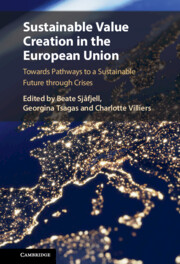 Sustainable Value Creation in the European Union
Sustainable Value Creation in the European Union Still Impossible?
from Part II - The (UN)Sustainability of the EU Economic System
Published online by Cambridge University Press: 01 December 2022
The late 2000s Eurozone crisis has constituted the cause for an extensive overhaul of the EU’s, and primarily the Eurozone’s, modus operandi. The modifications introduced include reinforced budgetary discipline and enhanced fiscal surveillance framework, but also substantial delegation of decision-making authority from the national to the supranational level. The changes are so extensive that this could be described as a fourth stage of economic and monetary union, or a Eurozone 2.0. The aim of the adopted measures has been argued to be a more economically sustainable development. This chapter analyses whether this has been the case. Have these measures created a more sustainable economic environment? Of particular interest is the criticism that the Eurozone suffers from severe socio-economic and cultural imbalances that render the entire project unsustainable. It is found that the changes introduced into the EU framework during the crisis have attempted to create a more cohesive and integrated Eurozone/EU, both economically and politically, but that it is highly doubtful whether such changes promote an efficient and sustainable model of economic governance.
To save this book to your Kindle, first ensure [email protected] is added to your Approved Personal Document E-mail List under your Personal Document Settings on the Manage Your Content and Devices page of your Amazon account. Then enter the ‘name’ part of your Kindle email address below. Find out more about saving to your Kindle.
Note you can select to save to either the @free.kindle.com or @kindle.com variations. ‘@free.kindle.com’ emails are free but can only be saved to your device when it is connected to wi-fi. ‘@kindle.com’ emails can be delivered even when you are not connected to wi-fi, but note that service fees apply.
Find out more about the Kindle Personal Document Service.
To save content items to your account, please confirm that you agree to abide by our usage policies. If this is the first time you use this feature, you will be asked to authorise Cambridge Core to connect with your account. Find out more about saving content to Dropbox.
To save content items to your account, please confirm that you agree to abide by our usage policies. If this is the first time you use this feature, you will be asked to authorise Cambridge Core to connect with your account. Find out more about saving content to Google Drive.